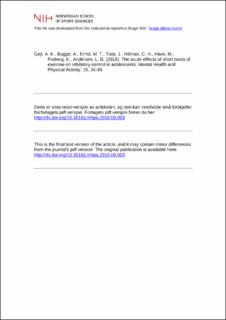| dc.contributor.author | Gejl, Anne Kær | |
| dc.contributor.author | Bugge, Anna | |
| dc.contributor.author | Ernst, Martin Thomsen | |
| dc.contributor.author | Tarp, Jakob | |
| dc.contributor.author | Hillman, Charles H. | |
| dc.contributor.author | Have, Mona | |
| dc.contributor.author | Froberg, Karsten | |
| dc.contributor.author | Andersen, Lars Bo | |
| dc.date.accessioned | 2020-03-06T10:38:50Z | |
| dc.date.available | 2020-03-06T10:38:50Z | |
| dc.date.created | 2018-07-26T14:58:44Z | |
| dc.date.issued | 2018 | |
| dc.identifier.citation | Mental Health and Physical Activity. 2018, 15(Oktober 2018), 34-39. | |
| dc.identifier.issn | 1755-2966 | |
| dc.identifier.uri | https://hdl.handle.net/11250/2645751 | |
| dc.description | I Brage finner du siste tekst-versjon av artikkelen, og den kan inneholde ubetydelige forskjeller fra forlagets pdf-versjon. Forlagets pdf-versjon finner du på sciencedirect.com / In Brage you'll find the final text version of the article, and it may contain insignificant differences from the journal's pdf version. The definitive version is available at sciencedirect.com | |
| dc.description.abstract | Purpose: The main objective of the study was to investigate the effect of short bouts of aerobic exercise with various exercise intensities on inhibitory control using a flanker task in adolescents. Methods: The study used a randomized controlled crossover design with 52 adolescents (mean age 17.7 years). On separate days, participants completed four exercise bouts consisting of three 5-min bouts at either 1) 50%, 2) 65%, or 3) 80% of maximal oxygen uptake reserve (VO2R), 4) one 30-min bout at 65% of VO2R, and 5) a control condition consisting of 30 min of seated rest. Conditions were counterbalanced between participants and completed at ∼4-day intervals. A modified Eriksen flanker task was conducted ∼8 min after each condition. Results: Compared to the rest Higher response accuracy across stimuli type (i.e., congruent and incongruent) was observed after five minutes of aerobic exercise regardless of exercise intensity, and shorter reaction time (RT) was observed following 80% of VO2R compared to the rest condition and compared to the remaining 5-min conditions. No selective effects on inhibitory control were observed. Conclusion: The results demonstrated that short bouts of aerobic exercise may be a time efficient approach for enhancing general cognitive processes required during performance of tasks that modulate inhibitory control demands. | |
| dc.language.iso | eng | |
| dc.title | The acute effects of short bouts of exercise on inhibitory control in adolescents | |
| dc.type | Peer reviewed | |
| dc.type | Journal article | |
| dc.description.version | publishedVersion | |
| dc.source.pagenumber | 34-39 | |
| dc.source.volume | 15 | |
| dc.source.journal | Mental Health and Physical Activity | |
| dc.identifier.doi | 10.1016/j.mhpa.2018.06.003 | |
| dc.identifier.cristin | 1598768 | |
| dc.description.localcode | Seksjon for idrettsmedisinske fag / Department of Sports Medicine | |
| cristin.unitcode | 150,34,0,0 | |
| cristin.unitname | Seksjon for idrettsmedisinske fag | |
| cristin.ispublished | true | |
| cristin.fulltext | original | |
| cristin.qualitycode | 1 | |
